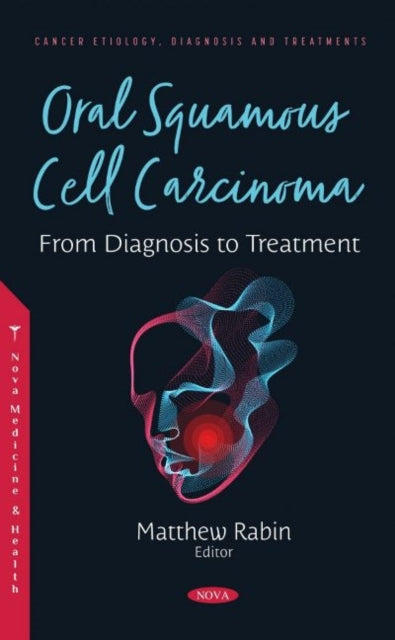Shulph Ink
Oral Squamous Cell Carcinoma: From Diagnosis to Treatment
Oral Squamous Cell Carcinoma: From Diagnosis to Treatment
YOU SAVE £28.89
- Condition: Brand new
- UK Delivery times: Usually arrives within 2 - 3 working days
- UK Shipping: Fee starts at £2.39. Subject to product weight & dimension
Bulk ordering. Want 15 or more copies? Get a personalised quote and bigger discounts. Learn more about bulk orders.
Couldn't load pickup availability
- More about Oral Squamous Cell Carcinoma: From Diagnosis to Treatment
This monograph discusses the diagnosis and treatment of oral squamous cell carcinoma (OSCC), including potential malignant disorders, diagnostic methods, biomarkers, drug delivery systems, cancer stem cell pathways, nanotechnology-based drug delivery systems, advanced nanomedicines, and the importance of biomarkers in early detection.
Format: Hardback
Length: 251 pages
Publication date: 01 September 2021
Publisher: Nova Science Publishers Inc
This monograph comprises five chapters that provide comprehensive insights into the diagnosis and treatment of oral squamous cell carcinoma (OSCC), the most prevalent malignant epithelial neoplasm affecting the oral cavity. Chapter One delves into the various potentially malignant disorders that can lead to the development of OSCC, encompassing diagnostic methodologies, the significance of biomarkers in OSCC therapy, the classification of biomarkers, the presence of existing biomarkers across different stages of OSCC, and the challenges associated with developing new biomarkers. Chapter Two focuses on principles, systems, technologies, therapeutic approaches, safety, and toxicity, as well as patents related to drug delivery systems for local oral squamous cell carcinoma treatment. Chapter Three aims to conduct a detailed critical review of previous literature on putative cancer stem cell pathways for oral carcinoma, highlighting the potential of targeting the most common cancer stem cell markers as a therapeutic regimen for oral cancer preneoplastic tumors, metastasis, and treatment progression. Chapter Four explores the recent advancements in nanotechnology-based drug delivery systems, advanced nanomedicines, and their diagnostics and therapeutic applications in OSCC. Finally, Chapter Five emphasizes the importance of biomarkers as an early diagnostic tool for detecting oral squamous cell carcinoma.
Chapter One:
This chapter explores the diverse range of potentially malignant disorders that can contribute to the development of oral squamous cell carcinoma (OSCC). It discusses the diagnostic methods used to identify OSCC, including histopathological examination, immunohistochemistry, and molecular techniques. The pertinence of biomarkers in OSCC therapy is examined, and the classification of biomarkers is discussed. Existing biomarkers in different stages of OSCC are explored, along with the challenges faced in developing new biomarkers.
Chapter Two:
Chapter Two delves into the principles, systems, technologies, therapeutic approaches, safety, and toxicity associated with drug delivery systems for local oral squamous cell carcinoma treatment. It discusses various drug delivery systems, such as nanoparticles, liposomes, and gene therapy, and their potential benefits in targeting OSCC. The chapter also explores the use of therapeutic agents, such as chemotherapy, radiation therapy, and targeted therapy, and their efficacy in treating OSCC. Safety and toxicity considerations are addressed, along with patent analysis related to drug delivery systems for OSCC treatment.
Chapter Three:
Chapter Three aims to highlight a detailed critical review of previous literature on putative cancer stem cell pathways for oral carcinoma. It draws attention to the importance of targeting cancer stem cells as a therapeutic approach for oral cancer preneoplastic tumors, metastasis, and treatment progression. The chapter discusses the most common cancer stem cell markers and their potential role in developing personalized treatment strategies for OSCC.
Chapter Four:
Chapter Four explores the recent developments in nanotechnology-based drug delivery systems, advanced nanomedicines, and their diagnostics and therapeutic applications in oral squamous cell carcinoma. It discusses the use of nanotechnology to enhance drug delivery, improve drug targeting, and enhance the efficacy of therapeutic agents. Advanced nanomedicines, such as nanosensors, nanomaterials, and gene therapy, are explored, along with their potential benefits in treating OSCC. The chapter also highlights the use of diagnostic tools, such as imaging techniques and molecular profiling, in detecting and monitoring OSCC.
Chapter Five:
Chapter Five emphasizes the importance of biomarkers as an early diagnostic tool for detecting oral squamous cell carcinoma. It discusses the significance of identifying biomarkers that can predict the risk of developing OSCC, the development of diagnostic tests based on biomarkers, and the potential use of biomarkers in monitoring treatment response and predicting disease recurrence. The chapter also explores the challenges associated with developing and validating biomarkers for OSCC and the need for interdisciplinary collaboration to advance the field.
Weight: 473g
ISBN-13: 9781536198959
This item can be found in:
UK and International shipping information
UK and International shipping information
UK Delivery and returns information:
- Delivery within 2 - 3 days when ordering in the UK.
- Shipping fee for UK customers from £2.39. Fully tracked shipping service available.
- Returns policy: Return within 30 days of receipt for full refund.
International deliveries:
Shulph Ink now ships to Australia, Belgium, Canada, France, Germany, Ireland, Italy, India, Luxembourg Saudi Arabia, Singapore, Spain, Netherlands, New Zealand, United Arab Emirates, United States of America.
- Delivery times: within 5 - 10 days for international orders.
- Shipping fee: charges vary for overseas orders. Only tracked services are available for most international orders. Some countries have untracked shipping options.
- Customs charges: If ordering to addresses outside the United Kingdom, you may or may not incur additional customs and duties fees during local delivery.


